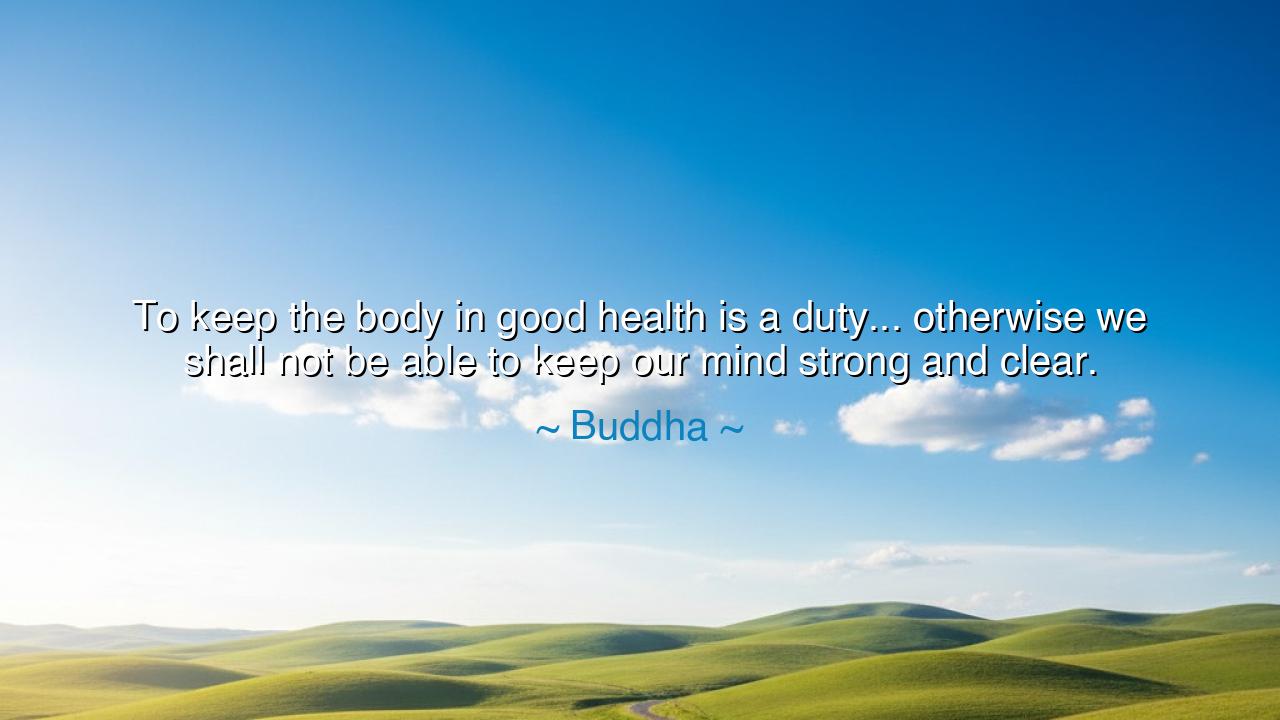
To keep the body in good health is a duty... otherwise we shall
To keep the body in good health is a duty... otherwise we shall not be able to keep our mind strong and clear.






“To keep the body in good health is a duty... otherwise we shall not be able to keep our mind strong and clear.” Thus spoke the Buddha, the Enlightened One, whose wisdom flowed not from theory but from experience — from the long journey of a prince who became a seeker, a seeker who became a teacher, and a teacher who became a light to the ages. His words remind us that the body and the mind are not enemies, nor are they separate realms. They are twin vessels of the same flame, and to neglect one is to dim the other. For the mind is the charioteer, but the body is the chariot — and how shall the charioteer reach truth if his chariot falls to ruin?
The Buddha knew this from his own path. In his youth, as Siddhartha Gautama, he dwelled in a palace of luxury, surrounded by every pleasure of the senses. Yet his heart was restless. He left behind his wealth and title to seek enlightenment through discipline. For six years, he practiced severe fasting and self-denial, thinking that holiness lay in destroying the flesh. But one day, as he sat beneath the Bodhi tree, weak and near death, he realized that starvation did not free the spirit — it only bound it in suffering. In that moment, he accepted a bowl of rice milk from a humble girl and understood the Middle Way: that health and clarity arise not from excess nor deprivation, but from balance. This realization became the foundation of his teaching — and it is from this truth that his words about the duty of health were born.
To keep the body in good health, then, is not a selfish act. It is an act of reverence. The Buddha taught that the body is the temple through which the mind may awaken. When we care for it rightly — with nourishment, movement, and rest — we create the stillness in which wisdom may dwell. But when we abuse or neglect it, we cloud the mirror of consciousness. Hunger breeds confusion, indulgence breeds dullness, and both lead the mind astray. The true seeker must therefore tend to his physical being as one tends to a sacred flame: feeding it, guarding it, keeping it pure.
Throughout history, we have seen this truth reflected in the lives of those who mastered both the body and the mind. Consider Mahatma Gandhi, who practiced restraint yet not starvation, simplicity yet not neglect. Through fasting, he learned control; through nourishment, he found strength. His body, disciplined but not broken, became the vessel of a mind so luminous that it guided a nation to freedom. He proved, as the Buddha taught, that spiritual power cannot flourish in the prison of bodily decay. Health, when nurtured with wisdom, becomes the ally of virtue.
But this teaching extends beyond monks and ascetics. It is for all people — the worker, the mother, the student, the elder — for every soul that seeks peace in a world of haste. The body is our first teacher. It tells us when we have strayed from harmony: through pain, fatigue, or sickness. Yet rather than listening, we often drown its voice in noise, in gluttony, or in ambition. The duty of health calls us to listen again — to eat with gratitude, to move with joy, to rest without guilt. For only when the body is at ease can the mind be truly free.
The Buddha’s wisdom is not a command to worship the flesh, but to honor it as a bridge to higher awareness. When the body is neglected, meditation becomes restless; when the body is overindulged, thought becomes clouded. The wise walk the path of balance, knowing that the sacred dwells in the ordinary — in each breath, each meal, each act of care. To keep oneself healthy is to show gratitude for the gift of life itself, for without this vessel, even the highest dreams of the spirit cannot sail.
So, dear listener, take this as your teaching: Health is not a luxury; it is a duty to the divine within you. To tend your body is to serve your mind, and to strengthen your mind is to uplift your soul. Do not treat your body as an afterthought, nor your mind as a tyrant. Let them live in harmony. Rise each day and move with intention; eat not to indulge, but to sustain; rest not in laziness, but in renewal. In this balance, you will find not only strength but serenity — the very state the Buddha called enlightenment, where the body is calm, the mind is clear, and the spirit is free.
Practical actions for the seeker: Begin each morning with stillness — breathe deeply and thank your body for carrying you. Choose foods that give life, not merely pleasure. Move your limbs each day as though you honor the sacred instrument they are. When tired, rest without shame; when restless, walk beneath the open sky. And above all, remember: to keep your body in health is to clear the pathway for your mind’s light to shine. Thus, you fulfill both your earthly duty and your divine calling — to live in harmony, to think clearly, and to be awake in the full glory of existence.






AAdministratorAdministrator
Welcome, honored guests. Please leave a comment, we will respond soon